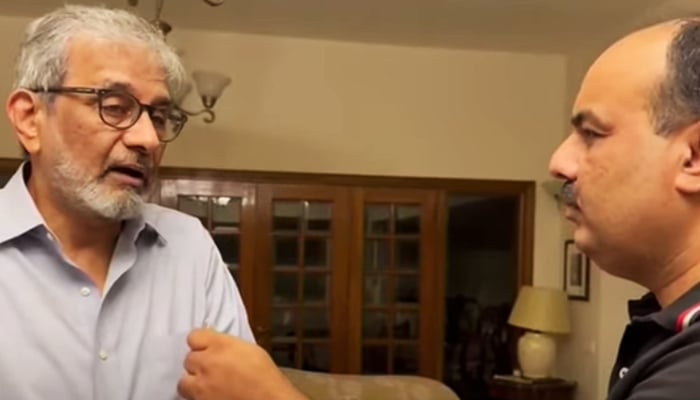'Important responsibility': Interim Sindh CM Baqar set to take oath tomorrow
Baqar was picked for top slot after three rounds of discussions between Sindh CM Shah and opposition leader
KARACHI: Justice (retd) Maqbool Baqar aims to address public issues as he is all set to take oath as Sindh's caretaker chief minister tomorrow (Wednesday, August 16).
Baqar was picked for the top slot after three rounds of discussions between outgoing Sindh Chief Minister Murad Ali Shah and Leader of the Opposition in the dissolved Sindh Assembly Rana Ansar — hours before their 3-day deadline was about to expire.
Ruling Pakistan Peoples Party (PPP) and Muttahida Qaumi Movement-Pakistan (MQM-P) both said that they reached a consensus and had no objections over the nominee.
Shortly after both of them agreed on the name, a summary was sent to Sindh Governor Kamran Tessori, who approved his appointment without any hurdles.
Sindh Governor Tessori then told Geo News that his oath-taking ceremony would take place on August 16.
As the news emerged of Justice (retd) Baqar's selection, the former Supreme Court judge vowed to play his role in upholding the law and the Constitution.
Talking to Geo News, Baqar said that holding elections was the responsibility of the Election Commission of Pakistan (ECP), adding that they would assist the election body.
He maintained that they would try their best for the upcoming general elections to be held as per the law and the constitution.
"It is a very important responsibility in such a difficult situation," he said, adding that he would try to resolve the people's problems.
Who is Justice (retd) Baqar?
Justice (retd) Baqar last served as a senior judge at the Supreme Court of Pakistan after receiving elevation from his post as the Sindh High Court chief justice on February 17, 2015. He was appointed as the top provincial judge of Sindh in September 2013. Justice (retd) Baqar retired from the SC in April 2022.
He garnered praise for his works as an excellent and brave jurist, particularly following a targeted attack on him by a terrorist outfit due to his judicial verdicts against terrorists.
Justice (retd) Baqar was also known for his critique of the judiciary. Following his retirement in April 2022, he once publicly pointed out severe flaws in the country's judicial affairs.
Born on April 5, 1957, the senior SC judge began his legal career with his enrollment as an advocate in May 1981 after completing his LLB from the University of Karachi. He was appointed as an additional judge of the Sindh High Court (SHC) on August 26, 2002, and confirmed as an SHC judge the following year.
While he was serving at the SHC, Justice Baqar’s judgments in terrorism cases irked terrorist outfits, after which he was targeted by Lashkar-e-Jhangvi terrorists in a bomb explosion on June 26, 2013, in Karachi. He, along with personnel of law enforcement agencies, suffered injuries in the attack. But the judge returned to work after months of rehabilitative surgery.
One of his notable judgments came in the case of the Baldia factory fire, which resulted in the largest compensation to the victims of the arson incident.
Justice (retd) Baqar has on multiple occasions highlighted flaws in the judiciary.
Even in his speech at the farewell reference for him at the Supreme Court, he conceded: “I believe that despite our efforts, we have fallen short of expectations. Delays and pendency remain at an all-time high across all courts in the country. The reality ought to be disconcerting for all stakeholders.
After retirement, he called out corruption in the judiciary. Participating in a session at the Karachi Literature Festival in February this year, Justice (retd) Baqar said corruption persisted in the judiciary and the induction of judges had not invariably been on merit as nepotism, favouritism, and the sacrifice of merit factored in.
He remarked that judges who were involved in unscrupulous activities tended to please people with power and authority and never confronted or offended them, and if any complaint was filed against them, it was swept under the carpet.
-
Security forces gun down 30 terrorists in multiple IBOs in KP: ISPR
-
MQM-P calls for new province in Sindh
-
US report validates Pakistan military edge over India: PM
-
Banned TTP poses serious threat to Pakistan security: UNSC panel
-
CM Afridi clarifies remarks on by-poll after ECP requests army deployment
-
Dubai sees 3.2m Pakistani passengers in 2025 as airport sets new milestone
-
Security forces kill 23 Indian proxy terrorists in KP's Kurram
-
Pakistan to construct island to boost oil exploration: report












